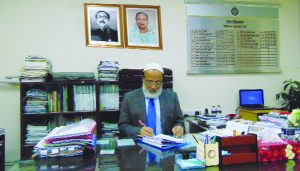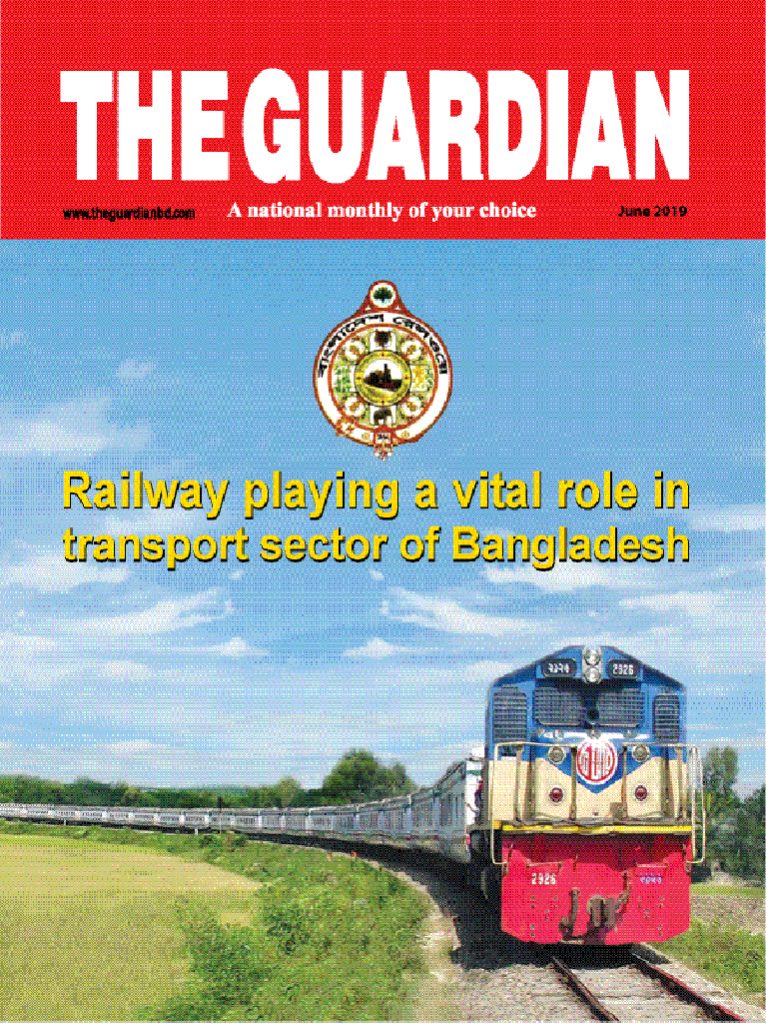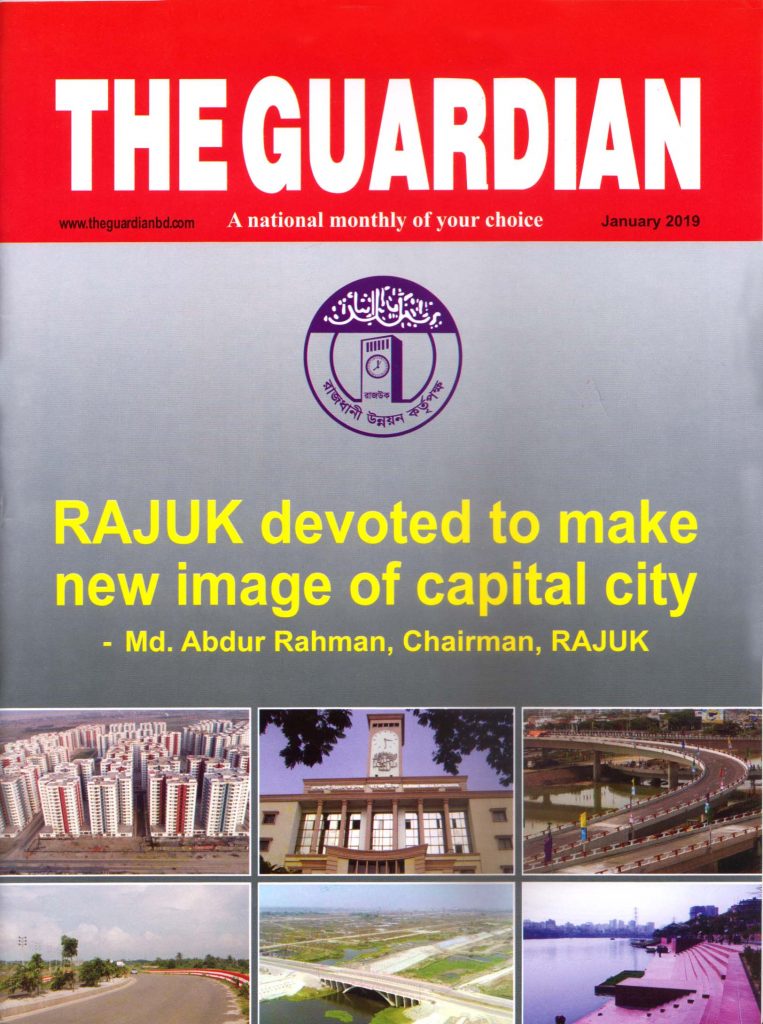Bangladesh Railway aspires to connect its network with every district headquarters to entertain the demands of its customers and to keep pace with the changes in the domain of transport in this very Indian sub-continent, said Engr. Qazi Md. Rafiqul Alam, Director General, Bangladesh Railway, in an exclusive interview with The Guardian.
Recalling the historic journey of Railway, which started on 15th November 1862, he said that Bangladesh Railway is committed to provide a safe, reliable and affordable rail transport service to the honorable passengers and the nation at large, keeping its long lived glory untarnished.
In this context, he mentioned that Bangladesh Railway with a route network of 2955.53 Km comprising of 676.66 km Broad Gauge (BG), 1846.09 km Meter Gauge (MG) and 432.78 km Dual Gauge (DG), has been playing a very vital role in the field of transport across the country.
He also informed that Bangladesh Railway has taken a number of important development projects like construction of the missing portion of Double line between Dhaka-Chattogram, rehabilitation of deplorable tracks, procurement of rolling stocks and modernization of signaling system during the ongoing regime of the Hon’ble Prime Minister Sheikh Hasina’s Government.
He then added that Bangladesh Railway has recently introduced Interactive Voice Response (IVR) system through Mobile Phone with a view to deliver train related information to its passengers. Bangladesh Railway, in addition, has taken initiative for computerization of pay roll, asset management, accounting, inventory control as the steps towards the implementation of Digital Bangladesh.
The Director General also added that Bangladesh Railway’s perspective plan is to provide a safer, faster and economical transport service by covering its network throughout the country. BR has been working hard to achieve this target.
In this context, he further added that Bangladesh Railway intends to provide an environment friendly, energy efficient transport service to reduce global warming to build a pollution free Bangladesh.
The Director General mentioned that present government has given utmost importance to the railway transportation over all modes of land transport system. He also informed that in 7th five year plan 50 nos. projects have been proposed at an estimated cost of BDT 247607.78 crore. In this context, he informed that Government has approved the revised Railway Master Plan for a period of 30 years that accommodates a sum of 230 nos. projects at a total cost of about BDT 5,53,662 crore.
He called upon the entire Railway employees to be vigilant and cautious to prevent accident and to maintain the punctuality of train services so that BR could step into a new era of land transport in Bangladesh.
In a long exclusive interview Director General Mr. Qazi Md. Rafiqul Alam, a high profile engineer and expert in railway management, replied to several questions covering the overall activities, problems, potentials, achievements and future plans of Bangladesh Railway including the initiatives of the present government for sustainable development of Bangladesh Railway and the railway transport system across the country.
His deliberations are quite outstanding, informative, educative and interesting as well. The excerpts of valuable interview have been presented here for The Guardian readers at home and abroad:
The Guardian: Please give us a short introduction to the founding history of rail communication in this part of the Indo-Pak sub-continent through which the Bangladesh Railway (BR) has come to its today’s position?
Director General: Bangladesh Railway (BR) is the biggest government owned transport agency in Bangladesh. BR has started its journey on 15th November, 1862 with the construction of BG line from Darshana to Jagati. In 1947, Bengal and Assam Railway was splited up and the portion within the boundary of East Pakistan was named as “Eastern Bengal Railway”. In 1962, a Railway board was formed and management of Railway was placed under the Provincial Government.
In 1972, it is renamed as Bangladesh Railway after emergence of Bangladesh as a sovereign country. On 23rd June 1998 Railway connection over the Jamuna Bridge has been established. It was the milestone of the expansion and development of Railway network in Bangladesh. On 14 August 2003 direct train service was started operating between eastern and western zones of Bangladesh Railway. At present, BR has coverage over 44 districts connecting all important areas of concerned districts.
The Guardian: Would you mention the current length of route coverage as well as communication network of BR across the country?
Director General: At present, BR covers the route of total 2955.53 Km throughout the country. Among these 1846.09 km MG route, 676.66 km BG route and 432.78 km DG route. BR has connected 44 civil districts of the country through this route length.
The Guardian: In this context, would you discuss the difference between broad gauge line and meter gauge line? In this context, would you say which one is very effective for a modern railway system?
Director General: Track Gauge is usually defined as the minimum distance between inner faces of two rails. The gauge width is 1676mm in Broad Gauge where as the width is 1000mm in Meter Gauge. In BR, BG line is available in most areas of western zone. Rest of the track is MG. Some portion of railway track has been converted to Dual gauge to facilitate the operation of both BG and MG trains.
Choice of gauge depends on criterion like cost, traffic, physical infrastucture of the country etc.
However, BG is more suitable for modern track. The reasons are higher speed, better riding comfort, increased track stability and more passenger capacity.
The Guardian: Would you mention the current number of departments, Zones and stations of BR across the country?
Director General: Bangladesh Railway (BR) consists of 13 departments. Among these four departments are directly linked with operation of Railway. BR is divided into two operational zones headed by General Manger. These are East Zone and West Zone. Total number of station is 466, of which 228 in East Zone and 238 in West Zone.
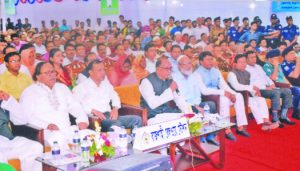
View of inaugural ceremony of Bonolota Express. Prime Minister Sheikh Hasina inaugurated Bonolota Express through video conference. Railway Minister Adv. Md. Nurul Islam Sujan, MP; Mayor of RCC AHM Khairuzzaman Liton, Former State Minister for Home Adv. Shamsul Haque Tuku, MP and Director General of BR Engr. Qazi Md. Rafiqul Alam, among BR and other high officials are seen present at Rajshahi Railway Staion.
The Guardian: Would you mention the total number of train plying in different routes every day?
Director General: Currently, total 354 trains ply through different routes of BR every day. Among these in East Zone 213 trains and in West Zone 141 trains and 24 trains ply in between both zones to carry passengers. Besides, 6 container trains and 20-25 goods trains ply every day.
The Guardian: Would you inform us about the number of manpower currently working in BR across the country and comment about their efficiency of works and services?
Director General: Total number of on-role employee in BR at present is 24,727 including officers and staff against sanctioned post of 40,275. Shortage of manpower in BR is 15,548. Especially, there is acute shortage of operating manpower like Loco master and Station master. On-role employees of BR are working very hard with sincerity to keep the operation smooth.
The Guardian: In this context, would you inform us about the salary structure and facilities available at BR for its employees?
Director General: Bangladesh Railway is a government organization. So, it follows government salary structure and facilities.
As a government organisation, BR provides some other facilities for its employees such as housing, medical, school etc. BR employees can avail limited privilege plus facility for their families.
The Guardian: Since BR is a technical and technology-based system of transport, would you say what special facilities should be created for railway employees so that they can be an efficient workforce to run their activities expectedly?
Director General: BR has its own training facilities to train its employees. Railway Training Academy (RTA) established in1984 is conducting regular training program for BR employees including BCS officials. Through various training programs at RTA, all the employees receive technical and technology-based knowledge. Up gradation of the training curriculum is a continuous process to keep the employees up to date. Besides, BR also arranges foreign training program to enable its employees adapt with new technology.
The Guardian: In this context, would you discuss the various institutional limitations and shortages of BR and suggest what immediate steps should be taken to meet all those limitations and shortages?

Prime Minister Sheikh Hasina inaugurated Bonolota Express through video conference. Railway Minister Adv. Md. Nurul Islam Sujan, MP; Mayor of RCC AHM Khairuzzaman Liton, Former State Minister for Home Adv. Shamsul Haque Tuku, MP and Director General of BR Engr. Qazi Md. Rafiqul Alam, among BR and other high officials, offering prayer at Rajshahi Railway Staion after PM’s inauguration of the train.
Director General: BR has undergone several reform programs since 1971, all aiming towards strengthening of institutional capacity and commercial orientation. Still BR has some institutional limitations. These are limited authority, outdated code, regulation, manual, inadequate training program, manpower shortage and too many departments.
To overcome these limitations, ADB funded Railway reform project and other technical assistance projects are also going on. Present government is sincere about bringing dynamism in BR. As part of it, separate Railway Division was created on 28 April 2011 followed by establishment of separate Ministry of Railways on 04 December 2011. And initiatives have been taken to develop human resource for increasing managerial capabilities of BR.
The Guardian: It is learnt that besides all of its existing services, BR has recently started some new services by adding new trains into its network across the country. Would you tell us something in brief about this?
Director General: BR has introduced some new trains to its services in recent years. New districts are getting connectivity besides the existing services. Bangladesh Railway has also extended its Railway network with India. This connectivity has ushered a new era of transportation of passengers and commodities as well as expanded opportunities for tourism among two countries.
Some of the new introduced trains in recent years worth mentioning are:
1. Introduction of first ever non-stop train service “Bonolota Express” from Dhaka-Rajshahi route on 25th April, 2019
2. Extending the route of “Drutajan Express” and “Ekota Express” trains to connect Dhaka and Panchagarh directly. The intercity train services “Drutajan Express” and “Ekota Express” started plying between Dhaka and Panchagarh on 10.11.2018
3. Introduction of “Tungipara Express” train between Gobra-Rajshahi on 02.11.2018
4. Introduction of Tangail Commuter Train between Dhaka and Bangabandhu Bridge (East)
5. Introduction of “Pabna Express” train between Pabna via Ishurdi Rajshahi on 14.07.2018
6. Introduction of non-stop train service between Dhaka and Chattagram “Sonar Bangla Express” on 25 June, 2016.
7. In 2017, International Passenger Train Service “Bandhan Express” Started its journey between Khulna (Bangladesh) and Kolkata (India).
8. The “Maitree Express” is in operation between Dhaka (Bangla-desh) and Kolkata (India).
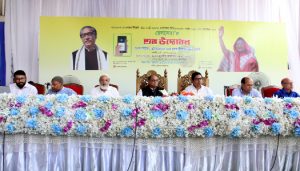
Inauguration of Mobile Apps for Digital Rail Service: Railway Minister Adv. Md. Nurul Islam Sujan, MP; State Minister for ICT Junaid Ahmed Pollok, MP; and Director General of BR Engr. Qazi Md. Rafiqul Alam are seen on the podium among others.
The Guardian: It is also learnt that besides all these new services, BR has already implemented a number of development projects and is also implementing some other development projects. Would you mention the successes of already completed projects and discuss the progress of the ongoing projects?
Director General: Bangladesh Railway has successfully implemented some vital projects in recent years such as Construction of Double Line Track from Tongi to Bhairabbazar, Conversion of MG Track into Dual Gauge on Parbatipur-Kanchan-Panchagarh & Kanchan-Birol Section and MG Track into Broad Gauge on Birol Station -Birol Boarder Section, Construction of 2nd Bhairab and 2nd Titas Bridge with approach rail lines, rehabilitation of Sholosahar-Dohazari & Fateabad-Nazirhat section, Khulna Railway Station and Yard remodeling, Procurement of 220nos BG and 100nos MG Passenger Carriages, Procurement of 20 MG and 26 BG Locomotives, Construction of one B-class station as Kaliakair between Mirzapur-Mouchak Station in connection with Hi-Tech Park etc.
Successful implementation of these projects has brought a lot of changes in Bangladesh Railway such as higher sectional speed, reduction in accident proneness and improvement of passenger amenities.
At present BR has been implementing 48 projects. Among these projects, 45 are investment projects and 03 are technical assistance projects.
The Guardian: It is further learnt that a number of more important development projects remain under the process of approval of the government and among these there are few foreign aided projects also. Would you tell us something in brief about this?
Director General: Railway is a safe and environment friendly mode of transport. Having realized this, present Government has given BR the utmost priority. To improve infrastructural capacity and to transform as a modern organization, BR has been implementing 48 projects now. And some project feasibility studies are under process.
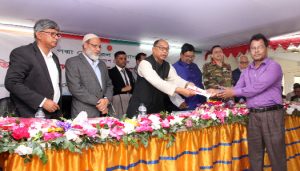
Railway Minister Adv. Md. Nurul Islam Sujan, MP is distributing fund for resettlement among PBRLP victims. Director General of BR Engr. Qazi Md. Rafiqul Alam, PD of PBRLP Golam Fakhruddin A. Chowdhury and Maj Gen Abu Sayed Md. Masud are seen present among others.
Some of these projects are:
1. Construction of Dual gauge Rail-line parallel to the existing Meter Gauge Rail line in Joydevpur-Mymensingh-Jamalpur section
2. Construction of Dhaka-Chattagram via Comilla/Laksham High Speed Railway
3. Construction of Karnaphuli Railway Bridge (Dedicated Railway Bridge)
4. Construction of Circular rail line around Dhaka City.
5. Construction of Rail Line from Bhanga Junction (Faridpur) to Payra Port Via Barisal
The Guardian: We all know our Prime Minister Sheikh Hasina through her Vision 2021 dreams of a digital Bangladesh, and so far we came to know that in implementing the agenda of Vision 2021 in railway, 25 development projects have been approved by the government to bring in a revolutionary change into the railway system of Bangladesh. Would you tell us something in brief about these projects and the progress of their implementation?
Director General: The present government’s election manifesto and vision 2021 includes a vision to increase the annual economic growth from 6% to 8%. An efficient and improved Railway system can play important role to achieve the vision by 2021. Present government has given Railway the topmost priority among all modes of land transport. Since 2009 total 81 new projects with approximate cost of BDT 108616.37 crore have been taken. Among those projects total 64 projects have been completed till now. In the ADP of 2018-19, Bangladesh Railway has included 45 investment projects and 3 technical assistant projects. In the Election Manifesto-2018 of the present government, among 10 mega projects concerning the infrastructural development of Bangladesh, Bangladesh Railway has been entrusted with the implementation of 2 mega projects.
Under the 1st LoC (Line of Credit) 816.01 million US$ was allocated for Bangladesh Railway for the implementation of 12 projects. By June 2018 Bangladesh Railway has completed 9 projects and the remaining 3 projects are going on. In addition to that approximately 1065 million US Dollar, under the 2nd and 3rd LoC, has been allocated for the construction of double line in Khulna-Darsana section of Bangladesh Railway, construction of a new carriage workshop in Saidpur, conversion of Parbatipur-Kaunia meter gauge track into dual-gauge, construction of a new dual gauge railway line from Bogura to Shaheed M. Mansur Ali station and building of an ICD at Ishurdi.
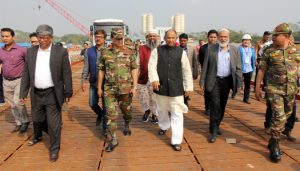
Railway Minister Adv. Md. Nurul Islam Sujan, MP is inspecting the site of Padma Bridge Rail Link Project (PBRLP). Director General of BR Engr. Qazi Md. Rafiqul Alam, PD of PBRLP Golam Fakhruddin A. Chowdhury and Maj Gen Abu Sayed Md. Masud are seen present among others.
Government policy is to connect BR with Trans Asian railway network. Government has also taken initiatives to establish regional connectivity.
Important projects worth mentioning are:
1. Construction of new BG Railway Line from Darsana to Meherpur via Damurhuda and Mujibnagar
2. Construction of new Tista Railway Bridge
3. Bangabandhu Sheikh Mujib Railway Bridge Construction
4. Construction of Akhaura-Agartala Dual Gauge Railway Line (Bangladesh Portion)
5. Procurement of 70 MG Diesel Electric Locomotive
6. Procurement of BG and MG Passenger Carriages
7. Construction of Broad Gauge Rail line between Chilahati and Chilahati Border for Connectivity in India
8. Construction of 3rd and 4th Dual Gauge Line in Dhaka-Tongi and Dual Gauge Double line in Dhaka-Joydevpur section
9. Construction of Khulna-Darsana Double line
10. Construction of Double Line between Joydevpur and Ishurdi section
The Guardian: So far it is learnt that, among all those development projects, Trans-Asian Railway Project is one of them, and Bangladesh as 20th signatory to the UN has signed the Intergovernmental Agreement on Trans-Asian Railway Network under the initiative of UN during the Caretaker Government of Fakhar Uddin Ahmed, which was approved by the Cabinet of Prime Minister Sheikh Hasina on 9 March 2009. Would you inform us about the latest activities of this project?
Director General: Three routes have been selected for Trans-Asian Railway Network. These are mentioned here.
1. TAR-Route-1: Gede (India)-Darshana-Iswardhi-Bangabandhu Bridge-Tongi-Akhaura Chittagong-Dohazari-Gundum Myanmar Border.
There remain two sub-routes: one sub-route-1 from Tongi-Dhaka and another sub-route-2 from Akhaura-Kulaura-Shahbazpur.
2. TAR-Route-2: Singabad (India)-Rohanpur-Rajshahi-Abdulpur-Ishurdi and then Route/Sub route of TAR-Route-1.
3. TAR-Route-3: Radhikapur(India)-Birol-Dinajpur-Parbatipur-Abdulpur- Ishurdi and then route/Sub- route TAR-Route-1.
Due to globalization process the world has become a small village. To survive in such situation interconnectivity among countries is very important. Present government is keen to connect Bangladesh with other countries in regional/sub-regional and Asian level through railway to facilitate trade, tourism and investment. Bangladesh Railway is implementing some projects to connect itself with Trans-Asian Railway Network.
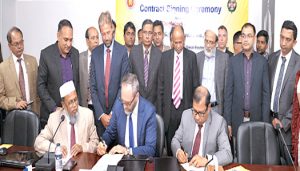
Contract signing ceremony between BR and Progess Rail Company of USA. ADG of BR and Senior Vice-President of Progess Rail Patric Odonel signed the contract on behalf of the respective organizations. Railway Minister Adv. Md. Nurul Islam Sujan, MP and Director General of BR Engr. Qazi Md. Rafiqul Alam are seen present among other high officials of the concerned organizations.
The Guardian: You also know that Prime Minister Sheikh Hasina in her Vision 2021 gives number one focus on digitizing the country as a whole. In this context, would you say what steps the BR has already taken to digitize its whole system and services across the country?
Director General: “Digital Bangladesh” is one of the main agenda of the present government to achieve transparency and accountability in government sector. Bangladesh Railway has taken several steps to implement government agenda of “Digital Bangladesh”. Some of the major steps are:
w Introduction of mobile App named “Rail Sheba” on 29 April, 2019 to provide e-ticketing and other services smoothly online
w Introduction of E-ticketing and computerized ticketing system on 29.05.2012
w Introduction of Mobile ticketing system on 4 March, 2010
w Introduction of Automatic Ticket Vending Machines (ATVMs) at Railway stations across the country
w Introduction of Train Tracking and Monitoring System (TTMS) through mobile phone SMS to 16318 from 16 January, 2014
w Introducing free Wi-Fi internet services at 24 railway stations
w 66 nos. Railway stations and 15 nos. important establishments/ office buildings are under the vigilance of CCTV.
w Procurement of ERP software under Railway reform project,
w Development of own Interactive and dynamic website.
w Introduction of computer based wagon control system,
w Recently the Ministry of Railways and ICT Division formed a joint committee to develop the one-stop Digital Railway Passenger Service System App. Bangladesh Railway is set to launch this integrated mobile app in 2020.
The Guardian: As a matter of fact, would your mention the amount of money allocated for BR in the current fiscal year to meet the cost of its administrative as well as the overall development expenditure?
Director General: Allocation of fund in 2018-19 fiscal year in development activities is as follows:
Total: Tk 7847.47 crore
GOB: Tk 2913.87 crore.
PA: Tk 4933.6 crore.
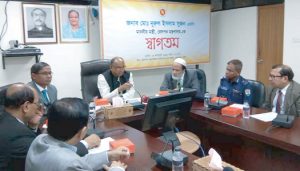
On the occasion of his joining as Railway Minisiter, Minister Adv. Md. Nurul Islam Sujan, MP is welcomed by the officials of Railway Ministry. Railway Secretary Md. Mofazzel Hossain and Director General of BR Engr. Qazi Md. Rafiqul Alam are seen present among other high officials of the Ministry and other organizations concerned with the Railway Ministry.
The Guardian: Would you give us an account of railway accidents for the last five years and mention what measures are taken to prevent accidents?
Director General: Details of accidents from year 2005-06 to 2009-10 are presented below in tabular form.
To prevent accidents BR has taken some vital and practical measures. These are given below.
w Rehabilitation of Railway track, Locomotive, coaches.
w Up gradation of level-crossing gate, providing additional barrier, appointing adequate Gate-keeper.
w Track doubling.
w Modernizing signaling system.
w Conducting training program to running staff.
w Observance of safety week, strengthening supervision.
w Building public awareness.
The Guardian: Would you say what arrangement is available at Railway to train the officers and staff about the different aspects of Rail communication, management, maintenance etc.
Director General: BR has got a built-in system of imparting training to Railway officials including BCS cadre officials and all categories of non-gazetted staff to enable them to improve their skills and ability. For safe and efficient operation of Railway a well-equipped and modern Railway Training Academy has been established in 1984 which is now located at Halishahar, Chattogram.
Four workshop training units at Pahartali, Dhaka, Parbatipur and Ishurdi have been transferred under the control of the Rector/Railway Training Academy, Halishahar, Chittagong. In the year 2017-18 total 587 persons of different categories were provided with training including 23 BCS cadre officials.
The Guardian: Would you inform us about the current profit and loss and assets and liabilities of BR?
Director General: Total operating revenue of BR for the year 2017-18 is Tk. 16,378.50 million, total expense Tk. 29,180.27 million, total operating income is (-) Tk. 12,801.77 million (considering the PSO and welfare grant).
Assets of BR can be divided into two main categories.
a. Infrastructure: Track 4324.75 km, route 2944.53 km, number of bridge/culvert 3143, station 466.
b. Rolling stock: Number of Locomotive 270, Coach 1578, Wagon 4121.
Bangladesh Railway also has been paying back the interest and installment of foreign loans.
The Guardian: Would you say how BR can be made a more profitable organization?
Director General: BR has become a losing concern as a result of negligence for decades. Its capacity to deliver service has also been decreased. During previous Awami League government establishment of rail network over Jamuna Bridge and construction of approach railway line was the milestone of railway network expansion. Present Awami League government has realized the potentials of BR and has taken major steps to salvage the organization from deplorable condition.
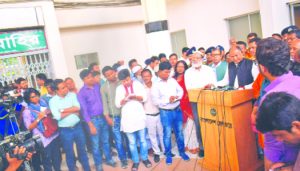
Railway Minisiter, Minister Adv. Md. Nurul Islam Sujan, MP is briefing the journalists on this first visit at Kamlapur Railway Station Director General of BR Engr. Qazi Md. Rafiqul Alam is seen present among other high officials of BR.
A huge number of projects are undertaken to rehabilitate/construct new railway line, procure/rehabilitate locomotive, coach, wagon etc. Modernization of signaling system and reform process of BR is also going on. After implementation of these projects there will be revolutionary change in BR and it will be able to become a profitable organization. Suggestions that can be considered to make BR profitable are stated as follows.
a. Introducing more freight trains.
b. Track doubling.
c. Proper land use plan.
d. Institutional reform.
e. Increasing fare rate.
The Guardian: In view of this, as a railway expert and engineering veteran of the sector, would you compare the railway communication with other modes of communication like roads and waterways?
Director General: Basic advantage of Railway is safety, speed and comfort which differentiate Railway from other modes of transport like roads and waterways. In comparison to other modes of transport, Railway is environment friendly as it consumes less fuel and causes less pollution. With a view to introduce environment friendly, modern train with bio-toilet facilities, BR has already imported BG coaches with bio-toilet facilities. Eventually, all the coaches will gradually be transformed into bio-toilet coaches.
Railway is a safety oriented organization. Occurrences of accident and injuries/death due to accident are minimal. Railway has the advantage of minimum land use and it is suitable for mass movement of passenger and freight at lower cost.
The Guardian: Keeping this in view, would you identify the problems and potentials of railway communication in Bangladesh and suggest possible solution to the problems? In this context, would also suggest what further steps the government should undertake to translate the potentials of railway into reality?
Director General: The railway network of Bangladesh which was inherited from the undivided India is totally unsuitable for the present changed traffic flow requirements. Bangladesh inherited a truncated portion of the Railway network of India. Problems of BR are stated below:
1. Non- uniformity in gauges.
2. Lack of investment.
3. Single line Railway track.
4. Deplorable condition of physical infrastructure i.e. Track, station building, bridge. Locomotive, coach, wagons are beyond their economic life.
5. Shortage of manpower.
The railway has the vast potentialities in Bangladesh. Major of them are:
- Environment friendly transport.
- Less consumption of fuel which ensures lower cost
- Suitable for mass movement of passenger and freight at lower cost.
- Less use of land.
The present government has properly identified the problems of Railway and also realized its potentials. Various projects have been taken to inject a huge investment to BR. After successful completion of these projects, BR will be able to deliver the services expected from it. Government has also taken initiatives for regional/sub-regional connectivity and establishment of Trans Asian Railway. BR needs adequate allocation of fund and continuity of development activities to enrich its performance.
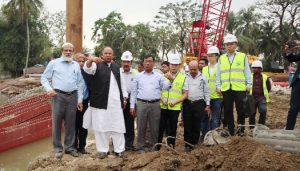
Railway Minister Adv. Md. Nurul Islam Sujan, MP is inspecting the site of Dohajari-Cox Bazar Project . Director General of BR Engr. Qazi Md. Rafiqul Alam, PD of the project Md. Mafizur Rahman are seen present among others.
The Guardian: In the end, would you please give your valuable message for all concerned with the railway, and especially for the people of Bangladesh?
Director General: Bangladesh Railway having a route network of 2955.53 Km comprising of 676.66 Km Broad Gauge, 1846.09 Km Meter Gauge and 432.78 Km Dual Gauge is playing a very vital role in the field of transport across the country.
Bangladesh Railway puts emphasis to connect its network with every District Headquarters. In order to keep pace with changes in the domain of transport in this sub-continent, Bangladesh Railway is relentlessly trying to cope up with the demand from its consumers. With commitment to the honorable passengers and rail users, Bangladesh Railway is trying to provide a safe, reliable and affordable rail transport service to the nation as a whole.
Bangladesh Railway has also taken some important projects like construction of the missing portion of Double line between Dhaka-Chittagong, rehabilitation of deplorable tracks, procurement of rolling stocks and modernization of signaling system during the ongoing regime of the Hon’ble Prime Minister Sheikh Hasina’s Government.
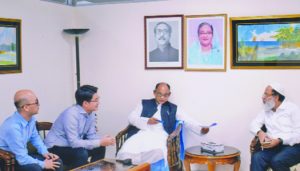
Railway Minisiter, Minister Adv. Md. Nurul Islam Sujan, MP is meeting a Chinese delegation. Director General of BR Engr. Qazi Md. Rafiqul Alam is seen present.
Bangladesh Railway has recently introduced providing train related information using IVR (Interactive Voice Response) system through Mobile Phone and has taken initiative for computerization of pay roll, asset management, accounting, inventory control etc. which are the steps towards the implementation of Digital Bangladesh.
The vision of Bangladesh Railway is to provide safe, reliable, cost effective and time efficient rail transport service in the country through modernizing, expanding and maintaining rail system in a manner which supports government strategies for economic, social and environmental development.
Bangladesh Railway also intends to provide an environment friendly, energy efficient transport service to reduce global warming which will build a pollution free country and ensure the sustainable development of our country.
In the end, I call upon the entire Railway employees to be vigilant and cautious to prevent accident and to maintain punctual train service, so that BR can usher in a new era of land transport in Bangladesh.
Profile of Rafiqul Alam
Qazi Md Rafiqul Alam, Director General of Bangladesh Railway, was born on the 5th July 1960 into a respectable Muslim family in the village of Ujani under the upazila of Kachua in the present district of Chandpur, which was once under the district of Comilla. His father’s name is Qazi Md Badiul Alam and mother’s name is Jahanara Begum.
He passed the SSC in Science Group from Dullai Nowabpur Ahsanullah High School under the education board of Comilla in 1975 and HSC also in Science Group from Comilla Victoria Government College under the same board in 1977. He obtained the BSc Degree in Civil Engineering from Bangladesh University of Engineering & Technology (BUET) in 1982.
Engr. Alam passed the BCS Railway Engineering Cadre in the BCS batch of 1983 and joined the Bangladesh Railway as Assistant Executive Engineer on 01 January 1984. During his long uninterrupted service career, he earned vast experience and knowledge in railway affairs through working in different responsible positions at field level and head office of BR.

Director General of BR Engr. Qazi Md. Rafiqul Alam, accompanied by PD of Dohazari to Cox’s Bazar Md. Mafizur Rahman, seen with CEO of Metropolitan Transportation Authority (MTA) of New York, USA among others after the end of their meeting held at New York on the issue of Railway Technology Transfer.
He worked as Assistant Executive Engineer/Project, Dhaka; Assistant Executive Engineer/ In-charge, Sayedpur; Executive Engineer/ Project, Chittagong; Divisional Estate Officer, Chittagong; Track Supply Officer, East, Chittagong; Bridge Engineer, East, Chittagong; Divisional Engineer-1, Paksey; Economist, Dkaka; Addl. Chief Engineer, Track, West; Divisional Railway Manager, Lalmonirhat; Managing Director, Kallyan Trust, Dhaka.
Then, he was Chief Engineer, West Zone of BR, Rajshahi from 04 May 2011 to 12 April 2014. He was appointed Project Director of Railway Reform Project at Rail bhaban, Dhaka and performed his duties with efficiency as PD from 13 April 2014 to 08 June 2014. He was General Manager, Project of BR at Rail Bhaban and continued this post from 09 June 2014 to 01 March 2015. He became Addl. Director General infrastructure and was given the charge of Railway infrastructure development till he was promoted to the post of Director General. This high-profile railway engineer, Mr Alam was finally appointed the Director General of BR on 30 September 2018.
During his long service life, Engr. Alam received a good number of training, attended many courses, seminars, symposiums and conferences at home and abroad. Some of them are Foundation Trainingg Course at RTA, Chittagong; Field Training, All Over Bangladesh; Foundation Training Course at BPATC, Savar, Dhaka; Survey, Settlement and Management Training Course under Ministry of Land, Gazipur; Training on Preparation of Project Proforma at Planning Commission, Dhaka; Mid-Level Management Training Course No.9 at RTA, Chittagong; Value Engineering/ Value Management at Engineering Staff College, Dhaka; Project Implementation and Administration at Asian Development Bank and Ministry of Finace, Dhaka; Group Training Course in Railway Management Planning by Railway Bureau, Ministry of Transport andJapan Railway Groups, Japan.
He visited India, Malaysia, France, USA, China, Japan, Australia, South Lorea, West Germany, Holland, Saitzerland, UK and Canada on the occasion of receiving education and training and learning lessons in different aspects of railway management and development.
Engr Alam is a committed public servant and a mild-mannered gentleman. He is an amiable person as well. He married Tasneen Jahan. She is a housewife. The Alams are passing a happy life with their two children, Farhana Jahan and Rasan Anjum Mahadey.


